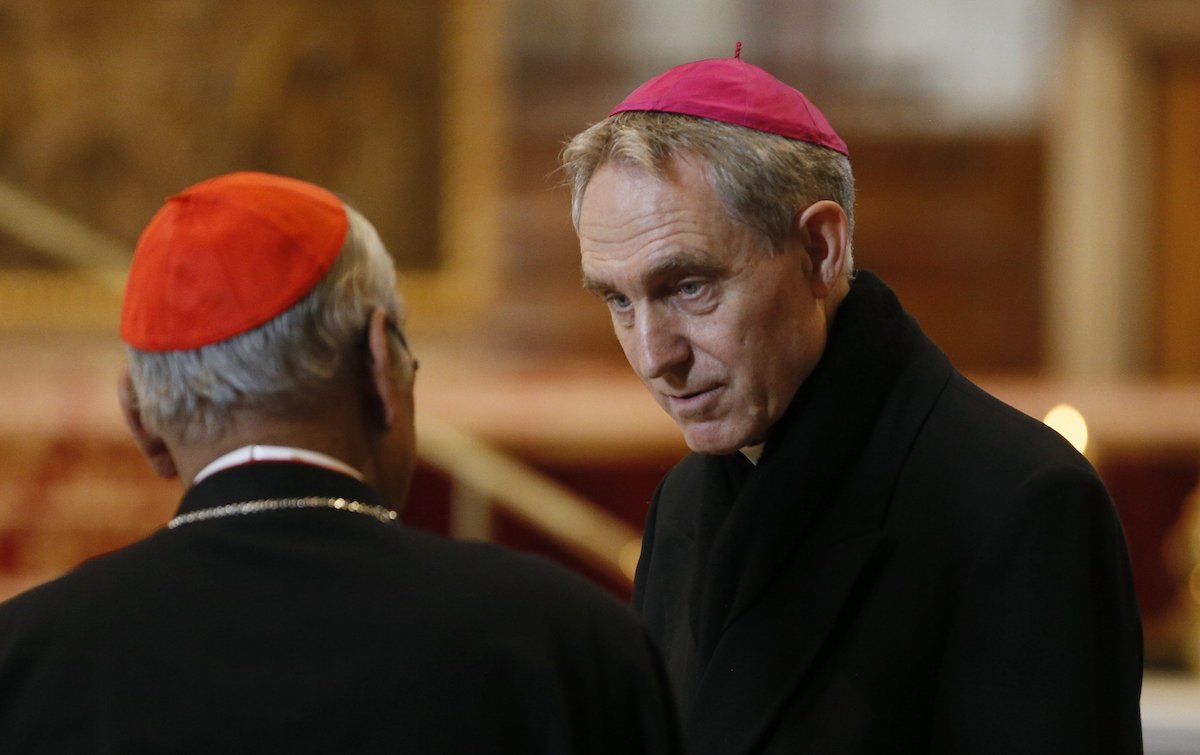By Cindy Wooden, Catholic News Service
VATICAN CITY (CNS) — The person closest to Pope Benedict XVI for the past two and a half years said the most important thing about him was that “the faith he learned, taught and proclaimed was the faith he lived.”
Archbishop Georg Gänswein, the long-time personal secretary to the late pope and the person closest to him after the death in July 2020 of the pope’s brother, Msgr. Georg Ratzinger, spoke to L’Osservatore Romano, the Vatican newspaper Jan. 4.
He was at Pope Benedict’s side when he died Dec. 31 at the age of 95, almost 10 years after he renounced the papacy saying he no longer had the energy to fulfill the papal ministry.
As the retired pope weakened, he said, “we usually prayed lauds in front of his bed. That morning, I said to the Holy Father, ‘Let’s do like we did yesterday. I will pray out loud and you join us spiritually.’ He could no longer pray out loud. He did not have the breath.”
After the prayer, he said, at about 8 a.m., the pope’s breathing became very labored, and the pope’s doctors told the archbishop he should call the members of the household — the consecrated women of Memores Domini, who ran the house, and Sister Birgit Wansing, his private secretary.
They already had prepared prayers for the dying, but after about 15 minutes it was clear Pope Benedict was having trouble breathing. They all began praying in silence, the archbishop said.
“He took his last breath at 9:34,” he said. “We continued praying, no longer for the dying but for the dead. And we concluded by singing ‘Alma Redemptoris Mater’ (‘Loving Mother of the Redeemer’).”
Archbishop Gänswein said he immediately phoned Pope Francis, who said, “I’ll be right there,” and he was.
“I accompanied him to the bedroom” where the deceased pope was, the archbishop continued. “He sat by the bed and prayed.”
L’Osservatore Romano, the Vatican newspaper, asked the archbishop about continued conspiracy theories about why Pope Benedict resigned in 2013 and the insistence of some people that it was not a fully free decision.
“The plain truth is this: he no longer had the strength to lead the church, as he said in Latin that day,” Feb. 11, 2013, when he announced his resignation at an ordinary consistory of cardinals, the archbishop said. “I asked, ‘Holy Father, why in Latin?’ He replied, ‘This is the language of the church.’ Those who think they found or need to find some other reason are wrong. He communicated the real reason. Amen.”
Archbishop Gänswein said he spoke to the retired pope on several occasions about how the conspiracy theories continued.
“Benedict replied, ‘Those who did not believe that what I said is the real reason for my resignation will not believe me even if I say now, ‘Believe me, it is so!'” he said.
As he has said on several occasions, the archbishop repeated that before the resignation, “I was among the first who tried to dissuade him. And he answered me sharply, ‘Look, I am not asking for your opinion, but I am communicating a decision of mine. Prayed over, suffered, made ‘coram Deo,'” in the presence of God.
Pope Benedict was the first to be “amazed” at how long he lived after retiring, the archbishop said.
But he also had said he used the time “to do what I had promised: to pray, to be present and, especially, to accompany my successor with prayer,” the archbishop said. “And this is beautiful.”
The interviewer did not ask about the claims of an Italian publisher that it would soon release a book by the archbishop that would talk about “the blatant calumnies and dark maneuvers that tried in vain to cast shadows on the German pontiff’s magisterium and actions.”






